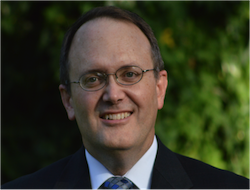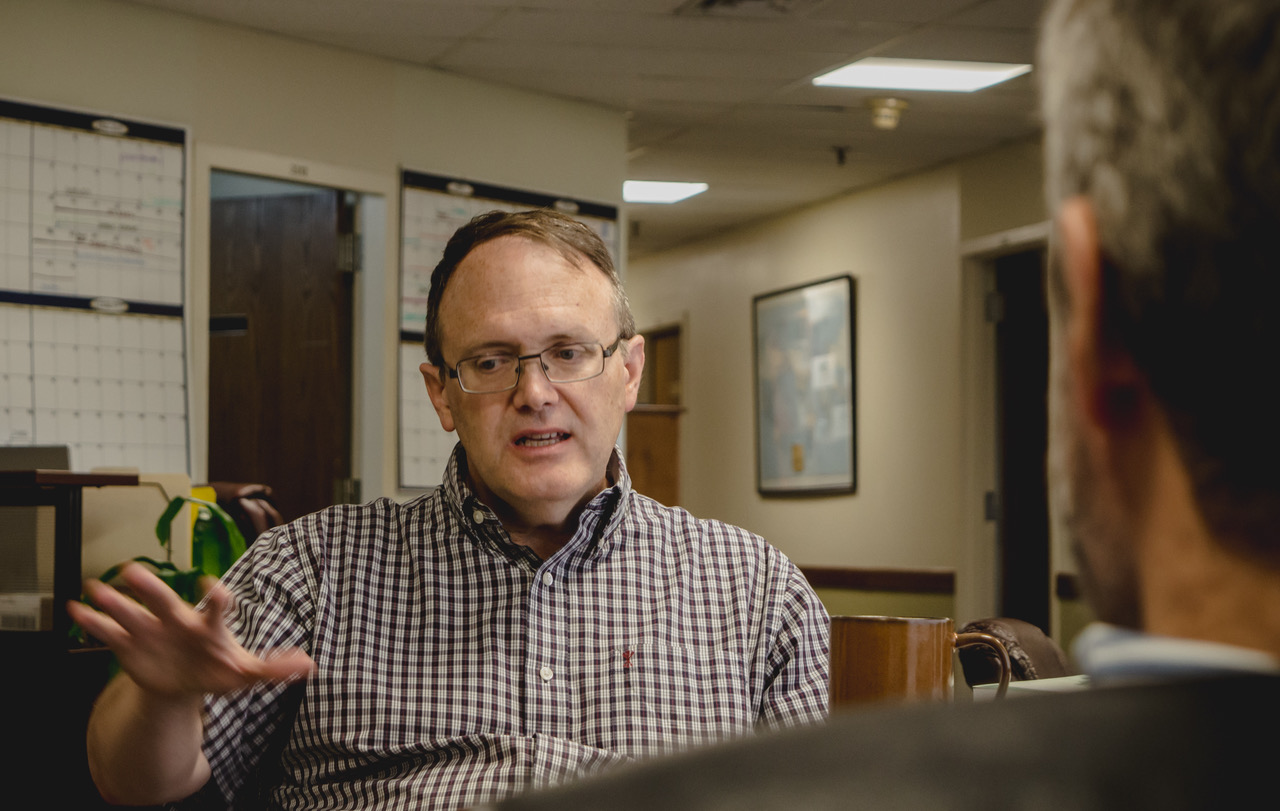Upon finishing Seminary in the States, Martin became a missionary to Spain where he served as a church planter and itinerant preacher. After several years in Spain, Martin returned to the United States to pastor in Texarkana. Now, he and his family have returned as missionaries to Spain in order to pastor, evangelize, and train church leaders in a congregation in Malaga.
Testimony of Conversion
I was raised in a religious but non-evangelical home where I was exposed to the Bible from an early age, but I had no clear instruction concerning the gospel of Christ. I cannot remember hearing a clear presentation of the gospel during my childhood years even though I frequently attended church services at the United Methodist Church in our neighborhood with my parents and my only sibling, an older brother. My parents were, humanly speaking, “good” people who gave me love and affection and taught me many valuable lessons for life, but I cannot say that they truly understood or believed the gospel. My mother once told me that she believed the gospel was summed up in the words, “Love your neighbor as yourself,” but of course, that is to confuse the law of God with the gospel of Christ. Such a moralistic message leaves sinners without a knowledge of their true spiritual plight or the provision God has made for the redemption of lost sinners through the sacrifice of His Son on Calvary.
I believe that it was during my high school years that I came to a saving knowledge of Christ. When I was fifteen years old, I made some Baptist friends who invited me to a Friday night meeting of the Campus Crusade for Christ organization. I began to attend meetings regularly each Friday night, and that led to my involvement in a small group Bible study where I began to read the Scriptures in earnest. My involvement with Campus Crusade led me to see very clearly from the Scriptures that Jesus Christ was not simply a great religious teacher but the eternal Creator who gave me my very being and who became incarnate to purchase salvation for lost sinners on the cross. I learned about the “Great Trade-off” that took place at Calvary when Christ took upon Himself the guilt and penalty of sinners so that His own personal righteousness might be “put to the account of” all those who believe. These were teachings that I had never heard before because the Methodist churches I had attended as a child were quite liberal theologically and rarely, if ever, mentioned the atoning death of Jesus, His sinless life, redemption through His blood, the need for a new birth, the lost condition of sinful mankind, the certainty of coming judgment, or the need for sinners to repentant and believe in Christ for salvation.
As I was learning these things, I began to come under a great sense of conviction for my sins. I realized that I had very strong, lawless desires in my heart and a desire to live according to the lusts of the flesh. I also began to feel a sense of spiritual impotence to overcome this evil inclination of my nature. Whenever I did something that made me aware of my sinfulness, I would try to ease my sense of guilt by redoubling my efforts at being a “good” or “religious” person in the vain hope that I could attain salvation by my own efforts. I thought inwardly, though I would never have expressed it outwardly at the time, “If only I am good enough and loving enough and sincere enough in my religious activities, then surely that will make up for my evil works, and God will accept me.” However, I had no assurance that my best efforts were good enough to please God or wipe out the guilt of my transgressions. I continued for a time in such a sad and miserable state until God, in His mercy, began to shine the truth of the gospel into my heart, showing me that my innate sinfulness, which I could not overcome “by works,” was the very thing that qualified me to be saved by Christ, who did not come to call the righteous but sinners to repentance!
One passage God used to open my eyes to the grace of the gospel was the passage in which Jesus pronounced the sinful woman, who washed His feet with her tears and wiped them with her hair, forgiven. The words, “Your faith has saved you. Go in peace,” were used by God to assure me that faith was the sole instrument by which we receive the forgiveness for our sins and enjoy peace with God. I realized that if Jesus could forgive that sinful woman simply through her looking to Him in faith for salvation, He could save me in the same way from all my sins and guilt. By the grace of God, I was enabled to look to Christ and cast the weight of my sin-weary soul on Him. Then, the peace of God and the joy of salvation flooded my soul.
I cannot point to the exact day or hour of my conversion, for it seems that the light of understanding was like a flickering candle flame in those days; it “blazed brightly” at certain moments, then grew dim again. Consequently, I found myself praying repeatedly for Christ to save me before coming to a settled assurance of my interest in Christ. As I continued to seek Him as my only hope, He strengthened the assurance that I was indeed forgiven and that I did truly belong to Him.
It was during my college years that I began to experience more intensified spiritual growth as I matured in my understanding of Christian doctrine. That was owing to several influences that the Lord brought into my life simultaneously. One influence was the Inter-Varsity Christian Fellowship on my college campus (Trinity University, San Antonio). I found a wealth of good reading materials on the Inter-Varsity book table. Among the books I discovered that made a great impact on my life were Knowing God and Evangelism and the Sovereignty of God by J. I. Packer, The Pilgrim’s Progress and Grace Abounding to the Chief of Sinners by John Bunyan, and various books by Christian devotional writers like A. W. Tozer and Andrew Murray. I also took a course on the Protestant Reformation, which introduced me to the writings of Martin Luther, John Calvin, and the other Reformers.
At the same time that I was attending Inter-Varsity meetings on my college campus, I also began to attend a local Bible church in San Antonio called Believer’s Fellowship. The pastor, a man named Joe Sahl, was a convinced Calvinist and a powerful preacher. I had never heard expository preaching in my life before I started to attend Believer’s Fellowship, and I was blown away by what I heard. Here was a man who did not just read a passage of Scripture as a prelude to a lifeless, moralistic message; rather, he took a passage of Scripture and opened up its meaning by explaining and applying it, and he did so with strong conviction and fiery zeal. I was frequently overwhelmed in those meetings by a sense of God’s presence and by the divine unction with which Joe proclaimed “the whole counsel of God” without compromise. The strongly Calvinistic content of the preaching, which emphasized human depravity and the totally gracious nature of salvation through Christ, was a refreshing antidote to the secular humanism that was bombarding me on the college campus during the week. I felt invigorated and encouraged to realize that my Christian faith could be defended against attacks by rabidly anti-Christian college professors.
My growing interest in the Scripture led me to volunteer to be a small-group Bible study leader for the Inter-Varsity organization. Every week, I invited fellow students to my dorm room to study the Scriptures together. It was my fellow students who first got me thinking about going to seminary. They said, “Martin, it is clear that you really enjoy teaching the Bible to others; and you seem to be gifted at it. Are you thinking about becoming a pastor?” I began to realize that this was indeed the desire of my heart, to make Christ known to others through the teaching and preaching of God’s Word. So, by the time I graduated from college, I knew that I wanted to go to seminary to better prepare myself for the ministry of the Word.
Call to Ministry
It was during my time in college that I came to the conviction that the Lord was preparing me for vocational ministry. I had gone to college originally as a drama major, having been quite active in local theater productions as a child and throughout my teenage years. Even after coming to faith in Christ at age fifteen, I continued to be quite interested in theater and all the arts, and for some time, I was convinced that I would pursue a career in acting.
During my first year in college, however, I realized that I could never be happy in the theater. As a young Christian, I saw that my outlook was changing dramatically. My heart’s desires were moving in a different direction than I had ever anticipated, and my values were now completely incompatible with the values of my peers in the college drama department, most of whom were quite liberal in their outlook, sexually promiscuous, and thoroughly pagan in their worldview. I felt like a fish out of water and realized that I could never pursue a career in acting, although I still appreciated and enjoyed drama as an art form.
The Lord was working profound changes in my heart, and one of those changes was to convince me that my real desire was to pursue the preaching of the gospel to others. I had a great longing to reach lost people with the message of salvation in Christ and to edify Christ’s sheep with the sound doctrine of Scripture. Thus, I began to think in terms of preparing for post-graduate studies at seminary. I left behind my pursuit of a degree in drama and became an English major, thinking that would lay a good foundation for all the sermon writing I would do in the future.
A year after graduating from college, I enrolled in the Reformed Theological Seminary in Jackson, Mississippi in order to pursue a Master of Divinity degree. My goal at that time was to prepare for a pastoral ministry somewhere in the United States. During my first year at seminary, however, my steps took a different direction when I began to study the subject of Christian missions. As I read about the work of missions in the past and became aware of the continuing need for workers on the foreign field, I found in my heart an awakening desire, indeed, an intense longing, to take the gospel to some unreached part of the world in order to preach Christ where He was not known. I remember a specific day when I was praying about this matter, and the Lord opened my eyes to see all the ways that He had prepared me for missionary work. I felt a burning desire to be used of God in this labor. The thought of proclaiming His Word to others in a different culture and in a different tongue filled me with a sense of joy and delight.
During my final year of seminary, I traveled to the Urbana Missions Conference in Urbana, Illinois; it was there that I first became interested in Spain because of some literature that I picked up from one of the mission tables at that conference. I learned that Spain was in great need of evangelical missionaries. Since it had been under the dictatorship of Francisco Franco for forty years, there was very little evangelical work in Spain. The country had only recently become a Constitutional Republic with a greater measure of religious freedom restored to the nation, and an openness to receive religious workers from other countries.
Through a series of steps, I began to prepare for ministry in Spain, and two years after graduating from seminary, that dream became a reality as I traveled to Spain for the first time in 1990 to work as a church-planting missionary. I became thoroughly fluent in the language as I prepared sermons and preached weekly in the church where I served. By the end of that first term, two things were clear to me: First, that I had found my niche as a Spanish missionary and wanted to remain serving in that capacity my whole life; and second, that I was not well matched with the mission with which I had chosen to align myself. It became clear to me that I needed to work with missionaries with whom I felt doctrinally and practically identified, in a mission with a more strongly Reformed doctrinal ethos.
When I returned to Spain in 1998, it was to work with a British mission that I had learned about called EMF (the European Missionary Fellowship). This was a mission that began in England in the period before WWII and had developed a distinctively Reformed doctrinal ethos under the leadership of Omri Jenkins, a man who sat under the ministry of Martyn Lloyd-Jones in London. I had met many of the missionaries working with EMF during my first term on the field. One of them, a Spaniard named José Moreno Berrocal, who pastored a small congregation in the town of Alcázar de San Juan in central Spain, asked me if I would like to work with him. I accepted the invitation and went to work with José as a local church evangelist and “supply preacher,” traveling to different villages in La Mancha and preaching to small evangelical congregations. During the five years I worked with Pepe, I became even more thoroughly assimilated to the language and culture of Spain, so that by the time I left Spain in the year 2003, I felt myself to be “half Spanish.”
About a year after my arrival in Alcázar, I met the woman who would become my wife, Paola Lorefice, the daughter of EMF missionaries to Italy, Pietro and Teresa Lorefice. We were married in Spain in November of the year 2000 and spent the first two years of our married life in Spain. It was in Spain that our only daughter Melody was born on April 6, 2002, in a hospital just outside Madrid. We fully anticipated remaining in Spain for many years. However, in the Lord´s unsearchable providence, we discovered that He had other plans for our lives—plans that brought us back to the United States, where we lived for the next eleven years.
Plans for Ministry in Spain
What redirected our steps back to the United States was the death of my only sibling, my brother Max, in November of 2001. His death impressed on me the need to return to the United States since my parents were in declining health. My father died in 2006, three years after our moving to Texarkana, and just two years ago my mother passed away, which meant that I no longer had any close relative in the United States. Shortly after my mother’s death, I was reading an article about Spain by a missionary friend of mine, Luís Cano, and what he said deeply touched me. Luis described the present need of the church in Spain for leadership. He spoke of how over the last decade, the number of workers in Spain had diminished, while the number of pastorless congregations had increased. This was due partly to the fact that many missionaries who planted churches in Spain had been obliged to leave Spain for one reason or another. This had left a vacuum of leadership in the churches because many of these departing leaders had not adequately prepared men to assume leadership responsibility in the churches. Many churches in Spain must depend on an itinerant preaching ministry by various pastors who rotate to care for these congregations. A friend of mine in Barcelona told me that the ratio of available pastors to churches, in his estimate, was about one to ten; one trained pastor for every ten congregations.
The situation is made even more dire by the current economic crisis in Spain. With a national unemployment rate of 25%, and with over 50% of young people in their twenties out of work, few congregations are able to support a full-time pastor/elder. Moreover, relatively few young men appear eager or willing to prepare themselves for future leadership ministry in Spain’s churches, a situation which does not bode well for the future of gospel ministry in Spain.
As I read the article by my friend Luís, I felt the Lord stirring in me an awakening concern for the present need of gospel workers in Spain. I decided to consult with some friends overseas to find out what I could about present needs, and three friends independent of one another told me about a small congregation of believers in the city of Málaga, which had been without any pastoral leadership for several years. They have depended on the ministry of itinerant preachers to be fed spiritually. I contacted that church, and eventually, we made a trip to Spain in 2013 to meet those believers and to find out more about the situation in Málaga. While there, I preached to the congregation in Spanish, and my ministry to them was warmly received. They let us know that there was an open door for us to serve in their midst.
During that trip, I also learned of another smaller, Reformed congregation on the outskirts of Málaga that also lacked pastoral oversight. It is located in a satellite community of Málaga called Churriana. Both churches reflect the situation of so many churches in Spain at the present time, which is a lack of leadership. There are simply not enough available workers to meet the existing need. There are not enough pastors to “feed the sheep” with the precious Word of God, nor enough workers involved in evangelistic outreach to take the gospel to Spain’s unsaved multitudes. Our Lord´s description of the society in his day fits perfectly the situation in Spain at the present time: “The harvest is plentiful, but the workers are few” (Matthew 9:37). The need of pastoral care in existing congregations is urgent, and the need for evangelistic outreach to the largely unconverted population of that country is truly desperate.
It is the overwhelming need of gospel workers in Spain that stirred my heart to return to Spain in the summer of 2015 and to undertake a new ministry in that city. My immediate goal is to shepherd the church in Málaga, as well as the other small congregation in Churriana. I also organize evangelistic outreaches into the city of Málaga (the fifth largest city in Spain with a population of some 500,000 inhabitants) and help in training younger men for future leadership ministry.
One of the great needs in Spain at the present time is for men with pastoral experience to train younger men to assume future leadership responsibility in the churches in Spain. This is a very important work, made all the more urgent by the diminishing number of gospel workers in this spiritually dark land. One young man in the church in Málaga named Rafael is very interested in preparing for future leadership ministry, and he has just finished a six-month course of study at EMF´s school of evangelism in Welwyn, England. But Rafael is young and has no pastoral experience. He, and other young men like him, need the help of older men who are fluent in the Spanish language and culture and are equipped to come alongside them in a mentoring role.





